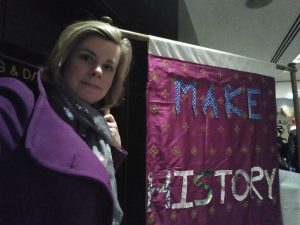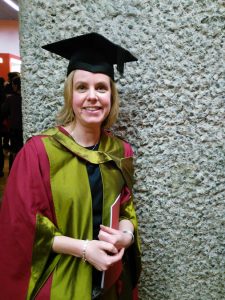The Information Literacy website editorial team recently invited Dr. Jane Secker to write a blog post for the website in her capacity as chair of the CILIP Information Literacy Group. In it she talks about the hard work that goes into running a special interest group; the new CILIP definition of information literacy; her new job at City, University of London; teaching academics at City; and running an ANCIL workshop at LILAC. Have a read!
On changing the world, education and information literacy
I was asked to write a blog post as Chair of the CILIP Information Literacy Group, and I have been thinking for a while about it should focus on. I’ve been Chair now for just over 3 years and I love the job, so much so that last year when I was offered a part-time job at City University I thought it would be great to actually be able to dedicate more time to this role. Chairing a special interest group is one of the best things I do, but also quite scary too, it’s fun but also really hard work. I feel I have a lot to live up to, after all the work Debbi Boden-Angell did to establish the group back in 2003, and I want to do justice to her efforts. I also have to work hard on areas where I am less strong, such as understanding budgets and planning. Elaine our Treasurer prepares the accounts expertly so helps me out hugely here and I now have two fantastic (and slightly humbling) Deputy Chairs in the form of Rosie and Lisa to work out what our priorities for the year are going to be, through our Action Plan. And Laura our wonderful Secretary has kept everything going over the past year, so I’m really grateful to them all.
Although it’s only May it’s been a good year so far and I was delighted to finally get the CILIP definition of information literacy updated and launched in time for LILAC last month. It was a real team effort though, and I can only take some credit, for trying to keep people motivated, setting deadlines for drafts to be completed and nominating our late, great Deputy Chair Rowena, to lead the group. We tried to take into account a wide variety of views when redrafting the definition, we sought and obtained approval from the CILIP board, but there were times, particularly late in the day where I just had to make a decision about specific wording. I believe hugely in collaboration, and all the work that ILG do is a testament to the fabulous committee that I have, but I also know that sometimes the job of the Chair is to be decisive and to lead. I hope I get that balance right, I try to ensure I am listening to others (yes I know, that does require me to occasionally stop talking) and I am also prepared to admit when I get things wrong (no one needs to remind me of last year’s AGM and my late arrival due to missing sunglasses!)

I mentioned my new job, well it’s not so new now. Having worked for almost 15 years at LSE as the Copyright and Digital Literacy Advisor, I made the leap to becoming an academic in educational development last April when I was appointed as a Senior Lecturer in the Learning and Educational Development team at City, University of London. After spending much of my career saying I was a librarian, but I didn’t work in the library, my new job at City was a step further away from libraries. However, for me remaining as the Chair of ILG was a no brainer, because I have never believed information literacy is a library issue. It’s definitely an issue that librarians care about probably more than any other professional group, but it’s not the preserve of libraries. In fact keeping IL in the library is probably what has hampered things most when it comes to getting a wider awareness of why it matters.
I see the ‘silo-ing’ of IL every day in my new job, when I work with staff on their module and programme specifications or when I teach them about teaching in higher education and educational technologies in the Masters in Academic Practice that we offer at City. The academics I teach care about information literacy hugely, and in fact it’s probably one of the issues they want to talk about the most, they just never call it that. They talk about how to help students ‘think critically’ become ‘independent learners’ to help them compare and contrast a range of opinions on a subject in their discipline and to be discerning. They care about the sources their students use, their over-reliance on the reading list and the problems they have when asked to do independent research. And they worry about plagiarism, a lot! But, I find that few immediately or ever think that librarians can help them here. They think this is all about discipline teaching and they need to do this all themselves. Or they may be stuck in the deficit model of wondering why they need to ‘spoonfeed’ what they assume are a group of digital natives who instinctively know how to do cool stuff with technology so must be able to write an essay and work out what academic journals are useful for.

Emma Coonan and I ran a workshop at LILAC this year where we asked people to reflect on their teaching as librarians and to be honest about whether they were teaching the broad range of abilities that ANCIL covers. I also asked people to think about how they were involved in curriculum development. The truth is that most librarians are not. Libraries are consulted when new modules or programmes are developed but in general this is to check on whether the resources are available, or if a budget is needed for new materials. Despite skills being an important part of most module specifications, there is not explicit need to think about who else the lecturer might work with to develop their students. When assessments are designed, librarians are rarely involved in helping to think about authentic ways that might test if those skills have been achieved. I’m delighted that in our MA at City marks are awarded in all our assignments for aspects related to information literacy, even if it’s just that the referencing and bibliography are correct. But there is so much more that could be done, not just by librarians, but by learner developers and careers staff too. I know this is an ongoing challenge, but I also know that being in this job is the right place to advocate for information literacy.
I’ve also been really pleased with the reception we’ve had to our new definition of information literacy. I wanted it to reflect my own beliefs about information literacy too, hence the use of the word ‘empowering’. I know I can be an idealist – yes despite getting on a bit, I still want to change the world and think I can make everyone happy. It’s not an easy task, nothing that is important is easy. I also know, and Debbi taught me this, that a bunch of motivated people working together can do great things, that can make a difference. And I’m going to keep on trying, if only in a small way, to work towards helping people be the best they can, be brave and be empowered. This year I’m concentrating on trying to find lots of new audiences to talk to about the things I care about. Those two things are still information literacy (and copyright of course!) but underneath it all what motivates me is my beliefs and something Paolo Friere said, so I apologise for paraphrasing him – that education changes people, and people then change the world.
Find out more about the work of the CILIP Information Literacy Group


Pingback: Marvellous May….. – Libraries, Information Literacy and E-learning
Pingback: The Library’s Buzz: Information Overload & Research | Ex Libris
Pingback: The Library’s Buzz: Information Overload & Research - Knjižnični informacijski sustav Nacionalne i sveučilišne knjižnice u Zagrebu